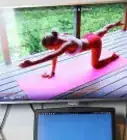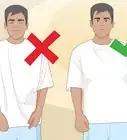This article was co-authored by Brendon Rearick. Brendon Rearick is a Personal Trainer, Strength Coach, Fitness Program Director, and co-founder of Certified Functional Strength Coach (CSFC), a fitness education company in the San Francisco Bay Area. With 17 years of experience in the fitness industry, Brendon specializes in strength and conditioning, and his company CSFC has certified over 3,000 trainers in over 20 countries. Brendon has worked as a Program Director for Mike Boyle Strength and Conditioning (MBSC) and earned his massage therapy license from the Cortiva Institute-Boston. Brendon holds a BS in Kinesiology from the University of Massachusetts Amherst.
There are 12 references cited in this article, which can be found at the bottom of the page.
wikiHow marks an article as reader-approved once it receives enough positive feedback. In this case, several readers have written to tell us that this article was helpful to them, earning it our reader-approved status.
This article has been viewed 261,685 times.
Side crunches are a great way to work out both your abdominal and oblique muscles in 1 exercise. There are a few variations to side crunches, but all of these exercises can help flatten your stomach and increase muscle strength and endurance in your core. Just make sure that you do not do twisting crunches more than once per week because this can stress your back. Try other types of oblique exercises, such as the side plank.
Steps
Doing a Back Lying Side Crunch
-
1Lie down on the floor. Lie down on a fitness mat. Lie with your back flat on the ground, legs together and knees bent.[1] Keep in mind that this movement is not recommended for anyone who has ever had a back problem.
- This movement can be made easier by placing your hands and arms lower on your body (crossing arms in front of your chest) or harder, by placing your hands and arms past your head (arms extended above your head).[2]
-
2Turn your legs to one side. With your knees remaining bent, turn at your waist and bring both of your legs to one side of your body, down to the floor. Your legs should be lying on top of each other.[3] As you bring your legs down to the floor, keep your shoulder blades and the upper part of your back flat on the floor.
- Your rib cage should be down and not flared out in this position. If you overextend, you risk straining your upper back.[4]
Advertisement -
3Crunch to your side. Place your hands behind or at the sides of your head. Flex your abdominal muscles, and lift your shoulders off the floor. Be sure to keep your shoulders straight and level just as you would for a normal crunch. Hold the position for a moment, then release your constricted abdominal muscles to slowly bring your shoulders back down to the mat.[5] [6]
- Do not pull at your head and neck to complete the crunch. Your hands are merely resting near your head as you contract your abdominal muscles to lift yourself up and crunch.[7]
- Exhale as you crunch and inhale as you return to your starting position. Then, repeat. Breathing properly will put your diaphragm in a better position for abdominal work.[8]
-
4Complete your crunches on the other side of your body. Once you have completed one set of crunches on one side of your body (about 10–15 reps), turn your legs over to do the crunches on other side of your body. It’s recommended to do this exercise 1–3 sets on each side, 2–3 times a week.[9]
Doing a Side Lying Side Crunch
-
1Lie down on the floor. Lie down on a fitness mat on one side of your body. Your legs should be stacked on top of each other.[10] Bend your knees.
-
2
-
3Crunch to your side. Exhale and contract your abdominal oblique muscles to lift your upper body off the mat and crunch.[13] Try to crunch to your side as high as possible, aiming to get your elbow as close to your thigh as you can.[14] Pause and hold the crunch for a brief moment before inhaling and coming back down to your starting position.[15]
- To make this exercise more challenging, lift up your knees simultaneously as you crunch. To make it even more challenging, you can straighten out your legs and simultaneously lift both of them up as you crunch.[16]
-
4Complete your crunches on the other side of your body. Once you have completed about one set of crunches (about 10–15 reps), flip over to lay on the other side of your body. Get into the same starting position you did before, with your knees bent and your arms in place, and complete a set on this side of your body.
- Do 1–3 sets of 10–15 reps on each side of your body. [17] Try to do these crunches about 2 or 3 times a week.
Doing a Side Crunch on an Exercise Ball
-
1Position yourself on the exercise ball. Sit down on top of the exercise ball, and walk forward so your back is resting on the ball. Your head and shoulders should not be resting on the ball, but instead, hanging off.[18]
-
2Position your legs. Twist your lower body so your legs are turned to one side. Extending your upper leg, and place your upper leg’s foot flat on the floor.[19] Bend your lower leg’s knee, and you can either keep this lower leg hanging (bent in the air), or place your foot back, past your body, and down on the ground.[20]
-
3Crunch to your side. Lean all the way back on the ball so your back follows the contour of the ball. Place both of your hands behind your head or cross your arms on top of your chest.[21] Exhale and contract your abdominal muscles to lift your upper body off of the ball. Hold this crunching position for a moment, then inhale and slowly relax your muscles to come back down onto the ball.
- Be sure that you are not pulling at your head and neck with your hands. Contract your core muscles to lift up off the ball.
-
4Complete your crunches on the other side of your body. Once you have done a set of crunches on one side of your body (about 10–15 reps), roll over to the other side of your body and position yourself in the same starting position as before. Complete a set of crunches on this side of your body.
- Do approximately 1–3 sets of 10–15 reps.
Doing a Plank Side Crunch
-
1Lay on the floor. Lay on one side of your body with your legs extended out straight, and on top of each other. Place your lower arm’s elbow on the floor, and make sure your elbow is directly underneath your shoulder. Prop and hold your body up on your elbow.[22]
-
2Crunch to your side. From your propped position, place your upper arm’s hand behind your head.[23] Inhale and contract your side abdominal muscles to crunch and bring your upper elbow down toward your side. As you crunch, the lower half of your torso and your hips are going to dip down to the floor. Hold the crunch position for a moment, exhale, then flex your side abdominal muscles again to bring your upper elbow and torso back up to your starting position.[24]
- As you come back to your starting position, you can extend even further than you started, bringing your elbow back and tilting your head down to the ground.[25] This will give your upper torso a convex curve.
-
3Complete the crunch on the other side of your body. Once you have completed one set of side crunches on one side of your body (approximately 10–15 reps), turn over and get into the same starting position as before, with your legs extended and your elbow propping up your body.
- Complete approximately 1–3 sets of 10–15 reps.
Doing a Standing Side Crunch
-
1Stand up and position your body. Stand straight up with your feet about hip width apart and your knees somewhat bent. Place one of your hands behind or at the side of your head.
- Whichever hand you bring to your head is the side on which you are going to start your standing crunch.
-
2Crunch to the side. Whichever side your hand is at your head, lift that same side leg up with your knee bent at a 90° right angle. Turn your knee out, so the side of your thigh is facing out as you crunch. As you bring your knee up, contract your side abdominal muscles to bring your upper body down.
- As you crunch, your elbow should be touching you knee.
- Try not to bend forward as you crunch. Keep your spine straight as your curve it down to the side.
- This crunch style is a great alternative for people who have poor mobility and can’t get down on the ground.
-
3Complete the crunch on both sides of your body. Once you have done one set of side crunches (approximately 10–15 reps), switch arms and legs to crunch on the other side of your body.
- Try to do 1–3 sets of 10–15 reps on each side of your body.
Expert Q&A
-
QuestionWhat common mistakes do people make when doing side crunches?
 Brendon RearickBrendon Rearick is a Personal Trainer, Strength Coach, Fitness Program Director, and co-founder of Certified Functional Strength Coach (CSFC), a fitness education company in the San Francisco Bay Area. With 17 years of experience in the fitness industry, Brendon specializes in strength and conditioning, and his company CSFC has certified over 3,000 trainers in over 20 countries. Brendon has worked as a Program Director for Mike Boyle Strength and Conditioning (MBSC) and earned his massage therapy license from the Cortiva Institute-Boston. Brendon holds a BS in Kinesiology from the University of Massachusetts Amherst.
Brendon RearickBrendon Rearick is a Personal Trainer, Strength Coach, Fitness Program Director, and co-founder of Certified Functional Strength Coach (CSFC), a fitness education company in the San Francisco Bay Area. With 17 years of experience in the fitness industry, Brendon specializes in strength and conditioning, and his company CSFC has certified over 3,000 trainers in over 20 countries. Brendon has worked as a Program Director for Mike Boyle Strength and Conditioning (MBSC) and earned his massage therapy license from the Cortiva Institute-Boston. Brendon holds a BS in Kinesiology from the University of Massachusetts Amherst.
Personal Trainer & Strength Coach
-
QuestionHow do you breathe during crunches?
 Brendon RearickBrendon Rearick is a Personal Trainer, Strength Coach, Fitness Program Director, and co-founder of Certified Functional Strength Coach (CSFC), a fitness education company in the San Francisco Bay Area. With 17 years of experience in the fitness industry, Brendon specializes in strength and conditioning, and his company CSFC has certified over 3,000 trainers in over 20 countries. Brendon has worked as a Program Director for Mike Boyle Strength and Conditioning (MBSC) and earned his massage therapy license from the Cortiva Institute-Boston. Brendon holds a BS in Kinesiology from the University of Massachusetts Amherst.
Brendon RearickBrendon Rearick is a Personal Trainer, Strength Coach, Fitness Program Director, and co-founder of Certified Functional Strength Coach (CSFC), a fitness education company in the San Francisco Bay Area. With 17 years of experience in the fitness industry, Brendon specializes in strength and conditioning, and his company CSFC has certified over 3,000 trainers in over 20 countries. Brendon has worked as a Program Director for Mike Boyle Strength and Conditioning (MBSC) and earned his massage therapy license from the Cortiva Institute-Boston. Brendon holds a BS in Kinesiology from the University of Massachusetts Amherst.
Personal Trainer & Strength Coach Exhale as you come up for your crunch. Then, inhale as you go back down to your starting position.
Exhale as you come up for your crunch. Then, inhale as you go back down to your starting position. -
QuestionAre crunches dangerous?
 Brendon RearickBrendon Rearick is a Personal Trainer, Strength Coach, Fitness Program Director, and co-founder of Certified Functional Strength Coach (CSFC), a fitness education company in the San Francisco Bay Area. With 17 years of experience in the fitness industry, Brendon specializes in strength and conditioning, and his company CSFC has certified over 3,000 trainers in over 20 countries. Brendon has worked as a Program Director for Mike Boyle Strength and Conditioning (MBSC) and earned his massage therapy license from the Cortiva Institute-Boston. Brendon holds a BS in Kinesiology from the University of Massachusetts Amherst.
Brendon RearickBrendon Rearick is a Personal Trainer, Strength Coach, Fitness Program Director, and co-founder of Certified Functional Strength Coach (CSFC), a fitness education company in the San Francisco Bay Area. With 17 years of experience in the fitness industry, Brendon specializes in strength and conditioning, and his company CSFC has certified over 3,000 trainers in over 20 countries. Brendon has worked as a Program Director for Mike Boyle Strength and Conditioning (MBSC) and earned his massage therapy license from the Cortiva Institute-Boston. Brendon holds a BS in Kinesiology from the University of Massachusetts Amherst.
Personal Trainer & Strength Coach Not if you do them safely. Make sure you have good form and don't overextend, as you could strain your upper back. Additionally, keep your neck neutral and don't try to use your hands to pull up your neck.
Not if you do them safely. Make sure you have good form and don't overextend, as you could strain your upper back. Additionally, keep your neck neutral and don't try to use your hands to pull up your neck.
Warnings
- Know the limits to what your body can and can't handle. Don't work out to the point of injury. You should feel a stretch, not pain.⧼thumbs_response⧽
References
- ↑ http://www.exrx.net/WeightExercises/Obliques/BWSideCrunch.html
- ↑ http://www.exrx.net/WeightExercises/Obliques/BWSideCrunch.html
- ↑ https://www.skimble.com/exercises/1834-alternating-side-crunches-how-to-do-exercise
- ↑ Brendon Rearick. Personal Trainer & Strength Coach. Expert Interview. 30 July 2020.
- ↑ http://www.exrx.net/WeightExercises/Obliques/BWSideCrunch.html
- ↑ https://www.skimble.com/exercises/1834-alternating-side-crunches-how-to-do-exercise
- ↑ Brendon Rearick. Personal Trainer & Strength Coach. Expert Interview. 30 July 2020.
- ↑ Brendon Rearick. Personal Trainer & Strength Coach. Expert Interview. 30 July 2020.
- ↑ http://www.latimes.com/health/la-he-try-this-levi-20140816-story.html
- ↑ http://www.bodybuilding.com/exercises/detail/view/name/oblique-crunches-on-the-floor
- ↑ http://www.shapefit.com/exercise-guides/abs-exercises-oblique-crunches-on-the-floor.html
- ↑ http://www.latimes.com/health/la-he-try-this-levi-20140816-story.html
- ↑ http://www.bodybuilding.com/exercises/detail/view/name/oblique-crunches-on-the-floor
- ↑ http://www.shapefit.com/exercise-guides/abs-exercises-oblique-crunches-on-the-floor.html
- ↑ http://www.bodybuilding.com/exercises/detail/view/name/oblique-crunches-on-the-floor
- ↑ http://www.latimes.com/health/la-he-try-this-levi-20140816-story.html
- ↑ http://www.latimes.com/health/la-he-try-this-levi-20140816-story.html
- ↑ http://www.exrx.net/WeightExercises/Obliques/BWSideCrunchOnBall.html
- ↑ http://www.exrx.net/WeightExercises/Obliques/BWSideCrunchOnBall.html
- ↑ http://www.exrx.net/WeightExercises/Obliques/WTSideCrunchOnBall.html
- ↑ http://www.exrx.net/WeightExercises/Obliques/BWSideCrunchOnBall.html
- ↑ https://www.youtube.com/watch?v=CMJA332bfs0
- ↑ https://www.youtube.com/watch?v=CMJA332bfs0
- ↑ https://www.youtube.com/watch?v=CMJA332bfs0
- ↑ https://www.youtube.com/watch?v=CMJA332bfs0
About This Article
To do a side crunch, start by lying on your back on the floor with your legs together and knees bent. Then, turn to one side at your waist so your legs come down to the floor with your knees still bent. Next, put your hands behind your head and contract your abdominal muscles to lift your shoulders off the floor. Lower your shoulders back down to the floor to complete the rep. Once you've done 10-15 reps, turn your legs over to the other side and complete a second set of crunches. For tips on how to do a side crunch on an exercise ball or a plank side crunch, read on!
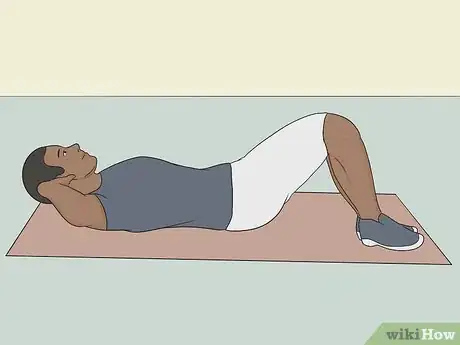








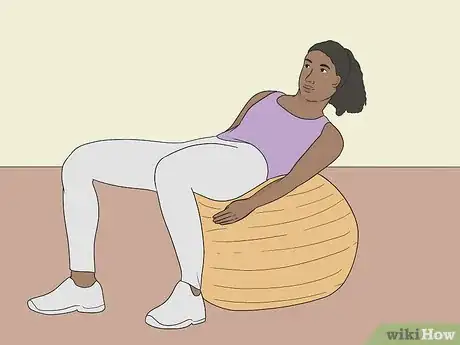

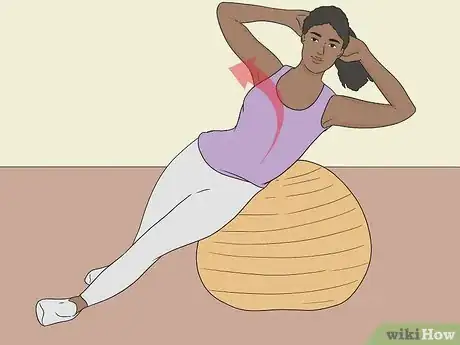
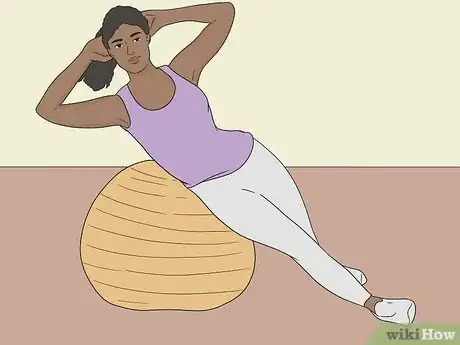
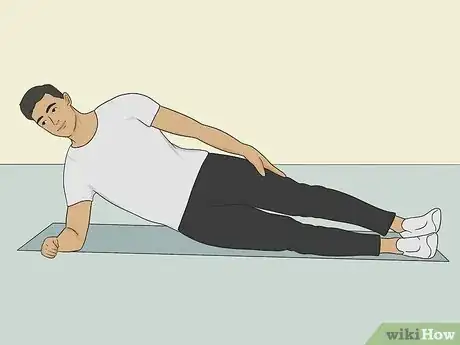



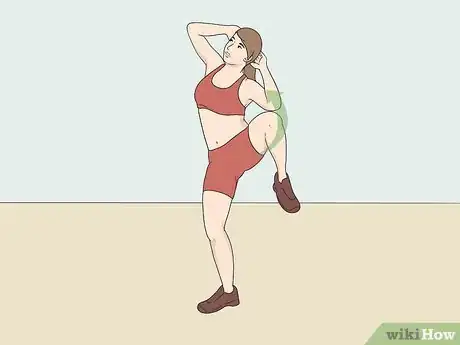


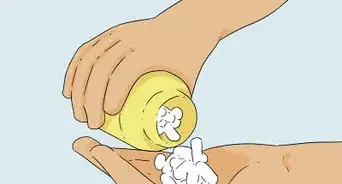


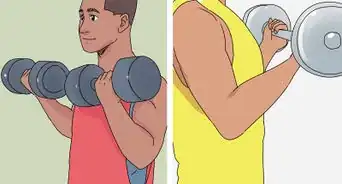

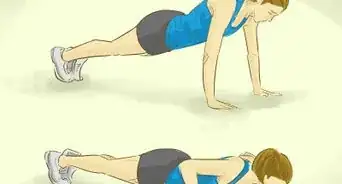
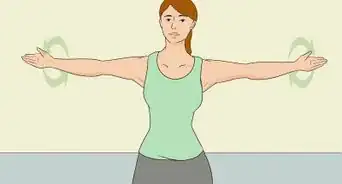
-Step-10-Version-5.webp)










